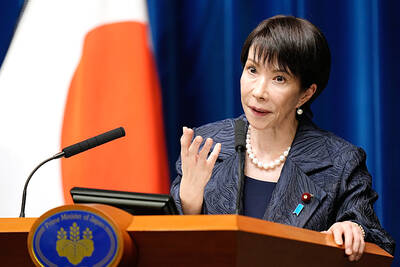The Cabinet’s Research, Development and Evaluation Commission (行政院研考會) revealed the results of a survey on the public’s views on carbon reduction.
A total of 771 adults were randomly selected for the survey, conducted last Wednesday and Thursday.
Of those questioned, 88 percent said they supported the government’s carbon-reduction campaign, the survey indicated. It also revealed that the campaigns that received the most support were reforestation, state and school efforts in energy conservation and a three-year nationwide campaign to switch to LED traffic signals.
Eighty-one percent of survey participants expressed knowledge of the priority the government has placed on carbon-reduction.
Almost 71 percent of respondents said they knew that the government is targeting daily life practices and transportation in its carbon reduction efforts.
Another widely received environmental campaign is a plan to switch to energy-saving light bulbs nationwide within four years, the survey showed.
The survey also indicated that 82 percent of respondents expressed support for creating special paths for bicycles in 25 counties to encourage citizens to ride bicycles as a form of alternative transportation.
The commission also revealed that 65 percent of respondents supported President Ma Ying-jeou (馬英九) and Premier Liu Chao-shiuan’s (劉兆玄) decision to swap suits and ties for cooler outfits, so the air-conditioning could be turned down.

The Ministry of Foreign Affairs (MOFA) yesterday voiced dissatisfaction with the Comprehensive and Progressive Agreement for Trans- Pacific Partnership (CPTPP), whose latest meeting, concluded earlier the same day, appeared not to address the country’s application. In a statement, MOFA said the CPTPP commission had "once again failed to fairly process Taiwan’s application," attributing the inaction to the bloc’s "succumbing to political pressure," without elaborating. Taiwan submitted its CPTPP application under the name "Separate Customs Territory of Taiwan, Penghu, Kinmen and Matsu" on Sept. 22, 2021 -- less than a week after China

THE GOOD WORD: More than 100 colleges on both sides of the Pacific will work together to bring students to Taiwan so they can learn Mandarin where it is spoken A total of 102 universities from Taiwan and the US are collaborating in a push to promote Taiwan as the first-choice place to learn Mandarin, with seven Mandarin learning centers stood up in the US to train and support teachers, the Foundation for International Cooperation in Higher Education of Taiwan (FICHET) said. At the annual convention of the American Council on the Teaching of Foreign Languages held over the weekend in New Orleans, Louisiana, a Taiwan Pavilion was jointly run by 17 representative teams from the FICHET, the Overseas Community Affairs Council, the Steering Committee for the Test of Proficiency-Huayu, the

A home-style restaurant opened by a Taiwanese woman in Quezon City in Metro Manila has been featured in the first-ever Michelin Guide honoring exceptional restaurants in the Philippines. The restaurant, Fong Wei Wu (豐味屋), was one of 74 eateries to receive a “Michelin Selected” honor in the guide, while one restaurant received two Michelin stars, eight received one star and 25 were awarded a “Bib Gourmand.” The guide, which was limited to restaurants in Metro Manila and Cebu, was published on Oct. 30. In an interview, Feng Wei Wu’s owner and chef, Linda, said that as a restaurateur in her 60s, receiving an

MORE RETALIATION: China would adopt a long-term pressure strategy to prevent other countries or future prime ministers following in Sanae Takaichi’s steps, an academic said Taiwan should maintain communications with Japan, as Japanese Prime Minister Sanae Takaichi is to lead a revision of security documents, Taiwanese academics said yesterday. Tensions have risen between Japan and China over remarks by Takaichi earlier this month that the use of force against Taiwan would constitute a “survival-threatening situation” for Japan. Prospect Foundation president Lai I-chung (賴怡忠) yesterday said Takaichi’s stance regarding Taiwan is the same as past Japanese prime ministers, but her position is clearer than that of her predecessors Fumio Kishida and Shigeru Ishiba. Although Japan views a “Taiwan contingency” as a “survival-threatening situation,” which would allow its military to